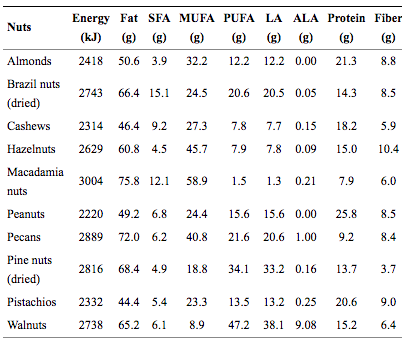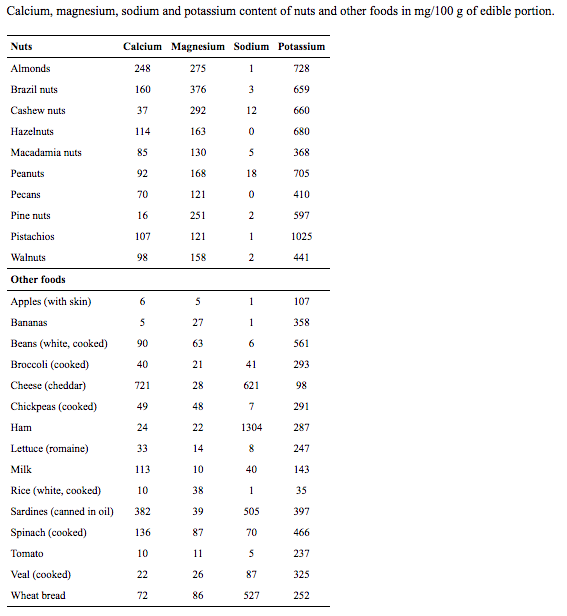Alex Speers ND, MS
When it comes to healthy snacks, it’s difficult to find a better option than nuts. While they may be small, a handful of nuts is densely packed with nutrition, including healthy fats, protein, and fiber. Nuts are a quality source of vitamin B9 (folate), antioxidants, and several important minerals, including calcium, magnesium, and potassium. At the end of this blog post, I’ve included a few tables comparing the nutrient composition of various types of nuts.
Research into the potential health benefits of nuts has primarily focused on heart disease, the leading cause of death in the US. Several observational studies have shown an inverse relationship between nut consumption and risk of heart disease; in other words, as nut consumption increases, risk for heart disease decreases. These findings prompted researchers to design several clinical trials to evaluate the effect of nuts on lowering cholesterol. As a result, researchers have found that many types of nuts, including walnuts, almonds, hazelnuts, pistachios, macadamias, and even peanuts, can lower LDL cholesterol (“bad cholesterol”) to varying degrees. Furthermore, there is new evidence to suggest that the positive benefits of nuts on heart health extend far beyond lowering cholesterol. In fact, the health benefits of nuts may extend beyond the heart and could impact the 2nd-leading cause of death in the US, cancer.
A newly published observational study from the Journal of Clinical Oncology sought to investigate the potential effects of eating nuts in patients with colon cancer. The study included 826 patients with stage III colon cancer who were treated with surgery and chemotherapy. Stage III colon cancer means that the cancer has made its way through the wall of the colon and into the abdominal cavity, where it has invaded local lymph nodes. The cancer is not yet metastatic, meaning that it hasn’t spread to distant organs. The 5-year survival for stage III colon cancer ranges from 53-89%, depending on how many lymph nodes are involved.
In this study, patients completed a food questionnaire, which included total nut intake. After a median follow-up of 6.5 years, researchers found that patients who consumed at least two 1-ounce servings of nuts per week improved their overall survival by 57% compared to patients who did not regularly eat nuts. In addition, nut consumption was associated with a 42% improvement in disease-free survival, a statistic used to measure the length that a patient is cancer-free following treatment. Interestingly, when the researchers tried to account for different types of nuts, they found that the survival benefit was limited to tree nuts only, which includes almonds, hazelnuts, walnuts, cashews, pecans, and pistachios, but not peanuts.
While this study is very exciting, the results do need to be interpreted with some caution. Because this was an observational study, it’s possible that other factors are at play in the apparent survival benefit from nuts; for example, it’s possible that people who eat tree nuts regularly are more likely to do other healthy things too, such as exercise or eat healthy diets, which could also potentially improve their survival. Regardless, given the numerous other health benefits of nuts, it appears that regular (tree) nut consumption for patients with colon cancer is a safe and worthwhile recommendation.
Fadelu T, Zhang S, Niedzwiecki D. Nut consumption and survival in patients with stage III colon cancer: results from CALGB 89803 (alliance). J Clin Oncol. 2018;JCO201774413 [Epub ahead of print]
Ros E. Health benefits of nut consumption. Nutrients. 2010;2(7):652-682.
DISCLAIMER: These statements have not been evaluated by the Food and Drug Administration. There are no financial ties to any supplement companies, pharmaceutical companies, or to any of the products mentioned in this post. This post is not meant to treat, cure, prevent, or diagnose conditions or diseases and is meant for educational purposes. As always, please consult your doctor before trying any new treatments or supplements.



